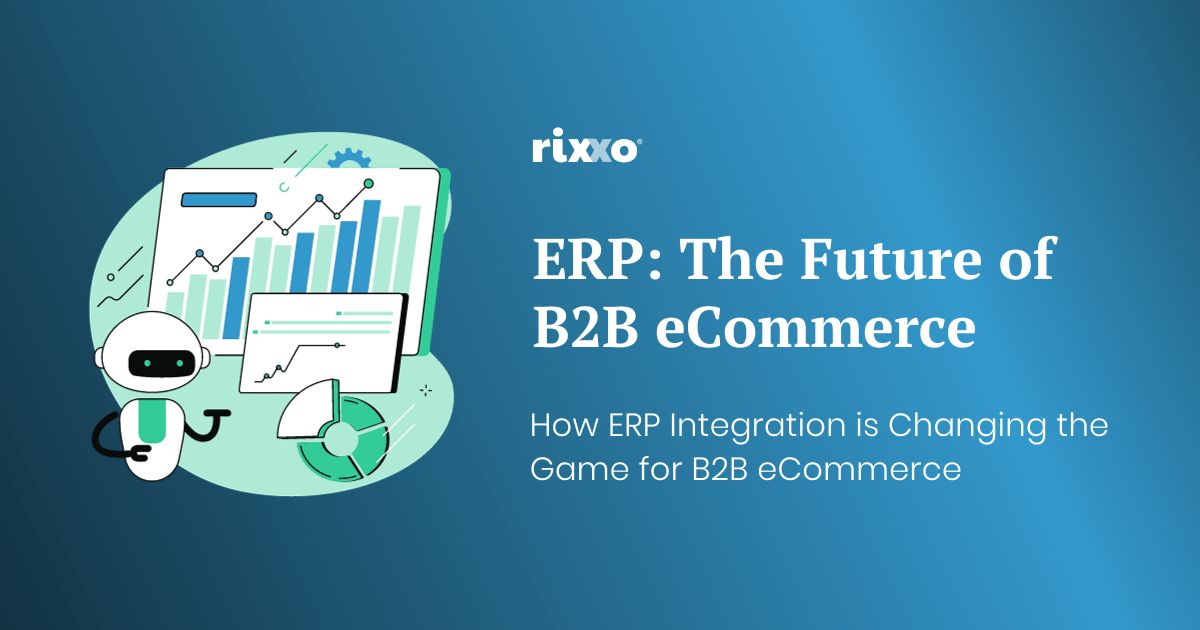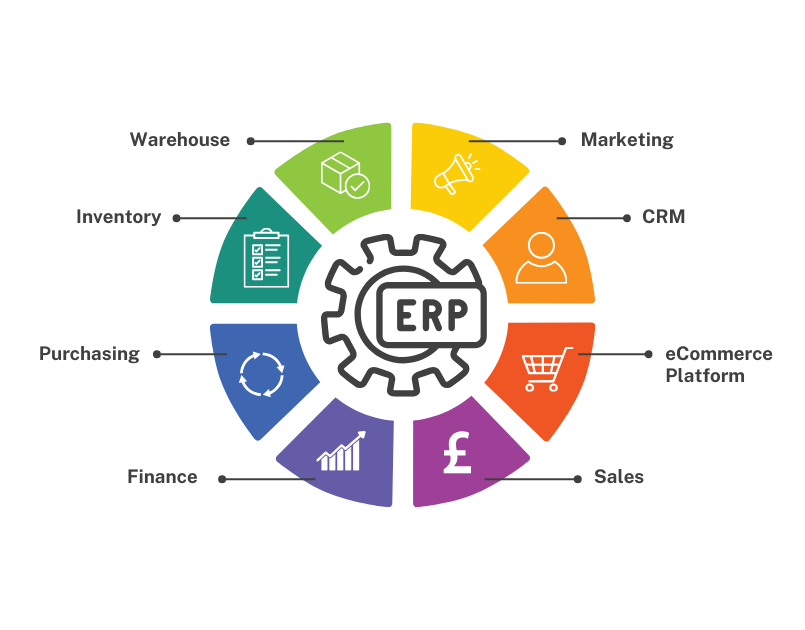The Future of B2B eCommerce: How ERP Integration is Changing the Game

Discover how ERP systems are revolutionising B2B eCommerce, paving the way for a more streamlined and efficient business landscape.
The Future of B2B eCommerce: How ERP Systems are Changing the Game
In the rapidly evolving landscape of business-to-business (B2B) eCommerce, there is a growing recognition of its potential to streamline operations, reduce costs, and enhance customer experiences.
This article explores the key role that Enterprise Resource Planning (ERP) systems will play in shaping the future of B2B eCommerce and the game-changing impact they are having on businesses right now. It outlines the key benefits of B2B eCommerce ERP integration and the challenges a business must face.
And if you’re wondering how to get started with an ERP integration for your eCommerce store, read on for links to further resources, including a 10-point action plan to help you get started.
The rise of B2B eCommerce
B2B eCommerce is booming. In the US alone, B2B e-commerce will reach $3 trillion dollars in the by 2027, up from $1.7 trillion in 2021, while more traditional business models will remain flat. Thanks to the rise of digital, companies can now connect globally, expanding their reach and tapping into new markets.


The COVID-19 pandemic highlighted the importance of digital platforms. Traditional methods faced challenges, making businesses lean heavily on online sales to meet demands. Online shopping simplifies and speeds up the buying process, enhancing customer experience. It also allows businesses to tailor their offerings using data insights, fostering customer loyalty.
The cost benefits are clear. By sidestepping physical stores and traditional sales avenues, businesses reduce overheads and can offer competitive prices. Advanced technologies like AI and blockchain promise even more innovation in this space.
In short, for modern businesses to thrive, embracing online shopping is not just beneficial—it’s essential.
The Role of ERP in B2B eCommerce
At the heart of the B2B eCommerce transformation lies something called Enterprise Resource Planning (ERP) systems.
ERP systems are software solutions that integrate various core business functions, such as finance, procurement, inventory management, supply chain, and customer relationship management.
By integrating eCommerce platforms with ERP systems, businesses can achieve real-time visibility into inventory levels, order fulfilment, and customer data. This integration streamlines processes, minimises manual errors, and enables businesses to deliver a consistent and personalised experience to their B2B customers, empowering businesses to operate more efficiently than ever before, at a speed and scale that was, until now, unimaginable.
For a deeper dive into what ERP is and how it works – check out our guide to eCommerce integration platforms.
The synergy between B2B eCommerce and ERP


The integration of B2B eCommerce platforms with ERP systems creates a powerful synergy that revolutionises the way businesses operate. This integration allows for real-time synchronisation of data, enabling businesses to access up-to-date information on inventory levels, order status, and customer insights.
By having a unified view of customer data, businesses can personalise their B2B eCommerce experiences, tailoring offerings, pricing, and promotions to individual customers. This level of personalisation strengthens customer relationships, increases customer loyalty, and drives repeat business.
With ERP, B2B eCommerce platforms can provide businesses with a holistic view of their operations, allowing them to optimise inventory management, streamline order fulfilment, and enhance supply chain visibility. This optimisation reduces lead times, minimises stockouts, and improves overall operational efficiency, leading to significant cost savings and the highest customer satisfaction levels.
The benefits of ERP integration in B2B eCommerce
The ultimate outcome a B2B eCommerce business can expect from ERP integration is a more agile, efficient, and competitive operation. ERP paves the way for improved customer satisfaction and loyalty, better financial health, and a strong foundation for growth and innovation. This strategic move can transform the business, positioning it for long-term success in an increasingly digital and interconnected marketplace.
In a B2B eCommerce setting, ERP is about creating a “digital backbone” for the business that ensures all parts of the organisation are working together in harmony. When every transaction from the eCommerce front-end is automatically reflected in the ERP system, the entire business operates with a synchronised rhythm. This integration touches every corner of the business, from supply chain logistics to customer-facing services, ensuring that data is not just accurate but also utilised to its maximum potential.
With such a system in place, a business becomes inherently more agile. Changes in demand, supply chain disruptions, and evolving market trends are all reflected across the business in real time. This allows for quick pivots in strategy and operations, keeping the business responsive and dynamic in the face of change.
Efficiency gains from ERP integration also extend to the workforce. Employees spend less time on mundane data entry tasks, which not only reduces human error but also frees them to engage in more meaningful work that can contribute to the growth of the business. This could be anything from improving customer relationships to developing new product lines.
In the context of customer satisfaction, ERP integration means that B2B clients receive accurate, up-to-the-minute information about their orders and deliveries. This reliability fosters trust and, over time, loyalty. A business that proves dependable can expect customers to return, and in the B2B space, where transactions are often larger and relationships longer-lasting than in B2C, this is particularly valuable.
Financial health is bolstered as well. With better inventory management and streamlined order processing, cash flow becomes more predictable and capital is not tied up unnecessarily. This financial stability is a bedrock upon which businesses can innovate and grow. It provides the means to invest in new technologies, enter new markets, and refine products and services.
By embracing ERP integration, a B2B eCommerce business doesn’t just improve its current operations; it sets itself up for a future where it can lead rather than follow. In a digital and interconnected marketplace, this can be the difference between a business that thrives and one that merely survives. It’s a strategic move that can yield dividends far into the future, ensuring long-term success in an environment that never stands still.
For a more detailed look at the benefits of ERP for eCommerce, check out our article: 10 Benefits of ERP for eCommerce Business
The challenges of ERP and B2B eCommerce integration
The clear advantages of a B2B eCommerce integration cannot be denied. However, the journey towards achieving an integration project is not without its hurdles. The process can be a daunting project for businesses, presenting multiple challenges that need to be addressed.
One of the most significant challenges is complexity. Integrating two or more diverse systems often poses a level of intricacy that businesses may underestimate. The act of melding an ERP system with an eCommerce platform is both technically demanding and time-consuming. It requires a deep-seated understanding of both systems to ensure seamless functionality.
Additionally, as businesses make the transition, there’s the colossal task of data migration and cleansing. Moving vast amounts of data between platforms necessitates rigorous oversight to maintain accuracy and consistency. This data, to be usable and reliable, must undergo a cleansing process. Cleansing involves detecting and rectifying, or even removing errors and inconsistencies that may compromise the quality of the data.
People, the backbone of any organisation, can also find this transition challenging. Naturally, humans can be resistant to sudden changes, especially when it disrupts their daily routines. As new systems and processes are introduced, it’s imperative to equip employees with the necessary training and resources. A well-devised change management strategy becomes vital in ensuring a smooth transition and making sure employees are comfortable and supported.
Lastly, the security and privacy of customer data stand at the forefront of concerns. The integration must be foolproof against potential breaches and cyber threats. Moreover, in a globalised business landscape, ensuring compliance with international data privacy regulations is not just ideal but mandatory.
While integrating ERP into a B2B eCommerce store promises to streamline operations and boost efficiency, businesses must be well-prepared to tackle the challenges that come with it. Proper planning, recruitment of integration experts, and a focus on continuous learning and adaptation are crucial for a successful integration project.
Hopefully, you can see how an ERP system integration can help your B2B eCommerce business streamline operations and scale to new heights. You’ve seen the benefits and now have a clearer view of the challenges ahead. So you’re probably thinking, “Where do I begin?” Don’t worry!
Our guide to eCommerce ERP integration includes a 10-point plan of action to help get you started on the right track.
Embrace the future: Stay competitive with ERP integration
The future of B2B eCommerce is being shaped by ERP systems. As businesses strive to meet the evolving demands of the digital age, ERP integration is becoming a necessity rather than an option. By embracing the power of ERP systems, businesses can unlock new opportunities, drive efficiencies, and deliver exceptional customer experiences.
Those who fail to adapt risk being left behind. Embrace the future, stay competitive, and thrive with ERP integration.
And don’t forget, if you need help and advice from a team who’ve successfully completed many eCommerce integration projects, get in touch for advice and a chat.
